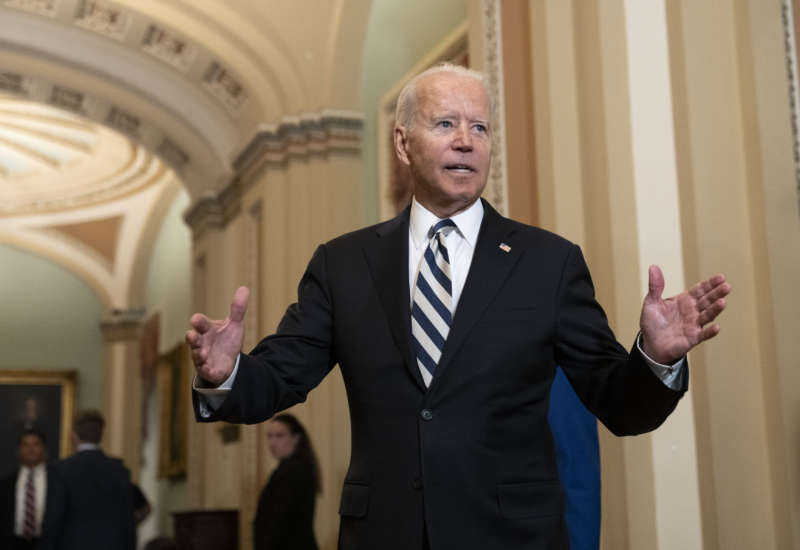Health care activists were uniformly disappointed, albeit not surprised, when President Joe Biden, in initially proposing the American Families Plan, failed to include in the legislation his major campaign promise to prioritize expanding Medicare.
The response from Democrats was as swift as it was tepid. Instead of fighting for real health care reform, the House and Senate wrote letters respectfully requesting the administration to tweak the plan around the edges: lower the eligibility age for Medicare from 65 to 60; decrease prescription drug costs; place an out-of-pocket cap on health care costs; and expand coverage to include dental, vision and hearing.
The letter failed to acknowledge the administration’s own desire to make increases to the Affordable Care Act’s health insurance exchange subsidies permanent, not to mention expanding Medicare to cover everyone, and include all medically necessary services, prescription drug coverage and long-term care. This should be what Congress is fighting for as COVID-19’s Delta variant brings the pandemic raging back with a fourth wave. Shamefully, they are not.
Why are progressive Democrats proposing such incrementalist reforms? What does this signify for Medicare for All supporters, and what are the prospects for such a program in the future? Rather than inspire, Democrats scold and deflate the energy necessary to win. Rather than organize, they ask for crumbs, get even less, and then blame activists for not supporting their “leaders’” plans.
Even the $3.5 trillion package Democrats are assembling, which addresses some health care concerns, still falls far short of what is needed to save a health care system besieged by a pandemic.
Weak Proposals Leave Much on the Table
Lowering the eligibility age to 60 sounds good. After all, it would add 23 million Americans to Medicare. However, of those, 75 percent already have private health insurance, 12 percent have Medicaid and 7.8 percent are uninsured. In other words, only 1.8 million individuals in this age group would gain health coverage that do not already have it. The proposal is even weaker than Hillary Clinton’s in 2016, when she offered to lower the age to 50 or 55 even without the presence of a global pandemic.
It is unclear what the bulk of the new beneficiaries, over 17 million individuals who have private health insurance through their employers, would choose to do. Do they buy supplemental coverage, or will they become cherry-picked by Medicare Advantage plans?
Passing H.R.1976, the Medicare for All Act of 2021, is the kind of history-making this country needs from Democrats right now. The pandemic is still here, and we cannot delay any longer.
The Office of the Inspector General reported that private Medicare Advantage plans continue to inflate risk-adjustment payments, cheating tax payers out of billions of dollars every year. Medicare Advantage companies, ready to enroll a healthier, younger group, are watering at the mouth with yet another proposal to increase profits and continue to drain the Medicare Trust Fund. (We are told funding will not come from the Trust Fund, although it is unclear how that would work.)
Are Democrats using tax dollars to expand Medicare simply to increase profits of corporations? Is this the message they want to send to the public as we gear up for midterm elections?
Equally unknown is what would happen to the 3 million people on Medicaid who would be newly eligible for Medicare. True, these low-income beneficiaries will have access to broader networks under traditional Medicare, but will certainly be exposed to more out-of-pocket costs, including premiums, deductibles, co-pays, prescription drug costs, and for some, a lack of dental, hearing or vision coverage.
Only a criminal health care system would deny dental, vision and hearing coverage at the time in one’s life when these are needed the most. No doubt Medicare needs to be improved, but this incrementalist approach makes it harder to mobilize a public that supports improved and expanded Medicare for All.
A program that only produces a small (and questionable) net gain of coverage for some, leaves the majority of the population without any incentive to join the fight. The July 24 rallies in over 50 cities, largely shunned by Democrats and corporate media, show people are ready to move for Medicare for All, not Medicare for a Few More.
The Fight That Will Mobilize the Nation
Democrats’ request, which the president agrees with, states that Medicare should have the power to negotiate with pharmaceutical companies and maintain the savings that would be achieved by such price negotiations — up to $450 billion over a decade — to pay for the improvements and expansions to Medicare. Sen. Bernie Sanders and 16 other Democratic senators write that their demands present “an historic opportunity to make the most significant expansion of Medicare since it was signed into law.”
Really? Democrats can make this a truly historic opportunity by doing everything they can to instead pass the Medicare for All Act of 2021, which would establish a national health insurance program for all U.S. residents from birth or residency; cover all medically necessary services including inpatient, outpatient, prescription drugs, mental health and substance use services, reproductive health care, gender-affirming care, dental, vision, hearing, physical therapy and long-term care; eliminate all premiums, deductibles, co-pays and co-insurance; abolish obscene profit-making from our health care system; reduce classism and racism by eliminating a means-tested program for the poor; save over 68,000 lives every year; eradicate medical bankruptcy; and save $458 billion every year.
Passing H.R.1976, the Medicare for All Act of 2021, is the kind of history-making this country needs from Democrats right now. The pandemic is still here, and we cannot delay any longer.


